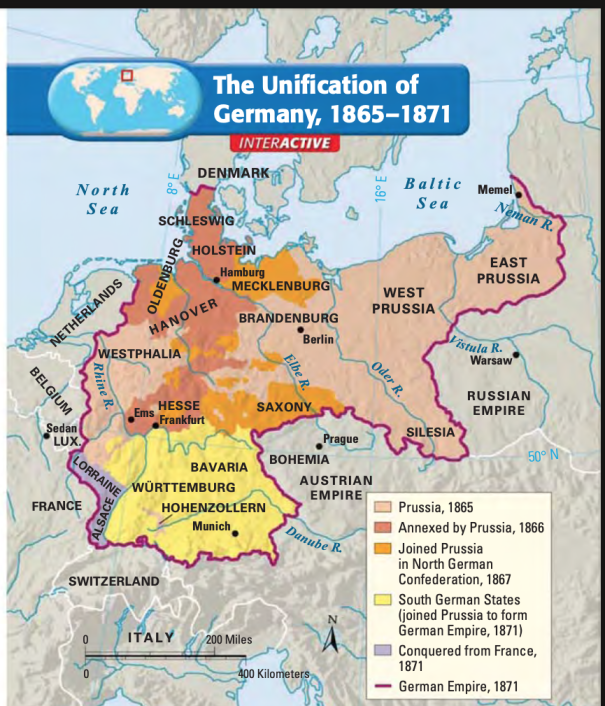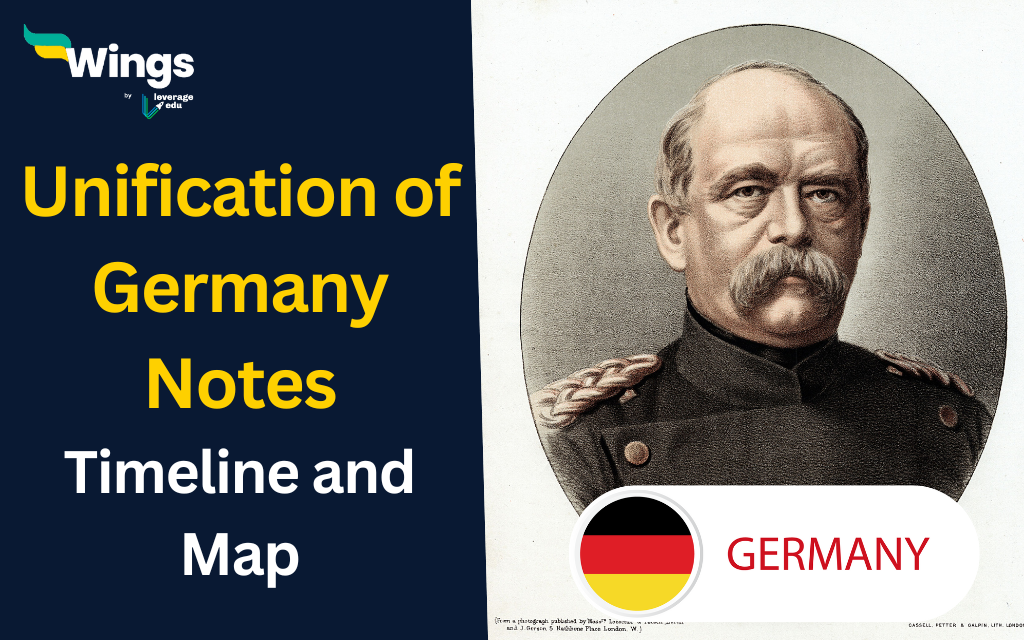Hey, guys! Mr. Owl is here. I see that you want to know about the ‘Unification of Germany’ Hootfully, I’ll be of help to you! Since we owls are very wise. If you scroll further down this blog, you’ll see all the information you will need!
The unification of Germany was announced on 18th January 1871 by Prussia in the Hall of Mirrors of the French Palace of Versailles. Germany was then merged with the German Empire, thus becoming a federalist state. For many years, this event would have had a significant impact on European politics.
The details from this article will be useful in the world history segment of the UPSC Mains Exam and many other Indian exams like CDS, NDA, Management, and university exams.
Contents
Unification of Germany: Timeline
To understand the various events leading to the Unification of Germany, it is important to know the timeline of these events. Knowing this will lead to a better understanding of the context in which the decision was taken. Below, the German Unification timeline is briefly mentioned for enhanced knowledge.
| Dates/Year | Events Leading to German Unification |
| October 1,1863 | Otto von Bismark became the Prime Minister of Prussia |
| October 21, 1866 | October 1, 1863 |
| (1868) | Congress of Princes |
| July 19, 1870 | Franco-Prussian War |
| January 18, 1871 | German Empire was officially formed under the leadership of William I |
| April 16, 1871 | Germany Adopted its Constitution |

Unification of Germany: Short Notes
A short note is provided below mentioning the German Unification in points. A brief, short note on the Unification of Germany is created using these points that summarise the whole event. Check out the German Unification summary in the points below.
- At the end of the Napoleonic War, regions with German populations were distributed across 38 states, of which Prussia was the strongest.
- In 1815, the German Confederation was formed, which included all 38 states as well as Austria.
- In 1848, a wave of democracy struck the German Confederation, and they set out to unite themselves in the Frankfurt Assembly to frame the constitution for a united Germany.
- However, due to the refusal of the Emperor of Prussia, such unification couldn’t materialise.
- In years to come, it was the blood and iron policy of Bismarck, who belonged to the Prussian aristocratic family.
- This policy was that of war, and pursuing it, Prussia attacked France and thus dissolved the old confederation and formed a North German Confederation in 1866, comprising 22 states.
- The Unification of Germany was eventually completed in 1870 due to the Franco-Prussian War, in which Louis Bonaparte was defeated.
- Because of this unification, William I became the king of Germany, and his swearing-in ceremony took place at Versailles, France.
Must Read: The Disintegration of USSR | World History Notes
Role of Bismarck in the Unification of Germany
Otto Von Bismarck was the mastermind behind Germany’s unification. As the driving force behind the unification of Germany under the Prussian Empire, he was one of the most influential individuals from the state of Prussia. The following is a list of Otto Von Bismarck’s accomplishments and contributions, along with his role in the unification of Germany:
- German unification is credited to Bismarck as its father.
- He was a great military commander and leader. He and King Wilhelm I helped the Prussian army make a number of military advancements.
- His main goal, for which he was also known as the Iron Chancellor, was to elevate Prussia’s standing in Europe.
- Bismarck was a visionary who had a number of goals for the nation, including unifying the north German states under Prussian rule, weakening Austria by severing its ties to the German Federation, making Berlin the centre of German affairs by displacing Vienna and bolstering the position of Wilhelm I, King of Prussia.
- To cover these additional military costs, a significant tax burden was placed on the populace.
- While the Prussian Parliament opposed the funds being raised through direct taxation, Bismarck used direct taxation to raise money for military reforms.
- These changes included a three-year extension of army conscription, the introduction of new weapons like the needle gun, and new combat strategies.
Significance of Unification of Germany
Germany’s unification marked a turning point in European history. The political landscape of the region underwent a significant change in balance with the entry of a newly united Germany into European politics, and other powers became wary.
Germany after unification was proud of its strong army and the speed with which it had united a large number of squabbling states under one state.
The new German state grew in size and began colonising parts of Africa and Asia, which put it at odds with other European powers.
Also Read: The Cold War Summary | UPSC World History Notes
Unification of Germany UPSC Notes: Download Free /PDF
From an IAS exam preparation standpoint, the Unification of Germany is a relevant topic that is included under the subject of World History. It is critical that candidates properly prepare for the topic and commit these facts to memory. Refer to the Best UPSC Books such as NCERT to ensure that all important sections are thoroughly covered. Revise the Unification of Germany UPSC topic with the help of questions provided below.
Here is a free PDF for the unification of Germany notes for UPSC CSE aspirants:
FAQs
Otto von Bismarck, who was Prussia’s Minister President at the time, instigated three brief, successful wars with Denmark, Austria, and France in the 1860s, uniting the smaller German states in support of Prussia in its victory over France. He created the German Empire in 1871 by uniting Germany into a single nation-state.
The unification of Germany fundamentally altered the delicate “balance of powers” established by the Congress of Vienna with the creation of a large, wealthy, and powerful nation-state in central Europe. Moreover, it is a useful case study for the broader concept of “nationalism” as a historical agent.
Four points of the unification of Germany are:
Zollverein (1834): Economic unification through a customs union that linked various German states.
Prussian Military Strength: Strong, disciplined army and advanced military tactics.
Diplomacy and Alliances: Strategic alliances and isolation of Austria and France.
Wars of Unification: Danish War (1864), Austro-Prussian War (1866), and Franco-Prussian War (1870-1871).
Bismarck, the Prussian Chancellor, unified Germany using his policy of “blood and iron.” He skillfully isolated Austria, defeated it in the Austro-Prussian War (1866), and used the Franco-Prussian War (1870-1871) to rally the German states against a common enemy, leading to German unification.
In 1871, Germany was unified as a nation-state with the proclamation of the German Empire on January 18, 1871, at the Palace of Versailles. King Wilhelm I of Prussia was crowned the first German Emperor, marking the birth of a powerful, unified Germany.
RELATED BLOGS
| Lord Chelmsford: Colonial Administrator and Military Leader | Warren Hastings: Life, Legacy and Lesson |
| The Disintegration of USSR | World History Notes – Leverage Edu | First India Pakistan War of 1947-1948: Causes and Aftermath |
| Civil Disobedience Movement in India: Date, Impact, Drawbacks | CBSE Class 10 White Revolution Notes (Free PDF) – Leverage Edu |
Hope you have gotten all the relevant information about the Unification of Germany! If you want to know more about topics like this, then visit our general knowledge page! Alternatively, you can also read our blog on general knowledge for competitive exams!


 One app for all your study abroad needs
One app for all your study abroad needs












 60,000+ students trusted us with their dreams. Take the first step today!
60,000+ students trusted us with their dreams. Take the first step today!